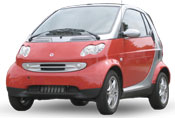 ENEMIES WITHIN ENEMIES WITHIN
I read with interest the article in the fall 2005 issue [page 7] of UC Davis Magazine about people surviving injuries but dying when something triggered their organs to fail. This phenomenon is not unique to human beings. I am hoping that the researchers are coordinating their research with the veterinarian school. I have had two horses (10 years apart) who survived surgery fine, but 10 days later, their livers gave out. That is the simplified version. The vet that treated the second horse once worked in a veterinarian research hospital. She told me that of all the horses of all sizes and all breeds treated by their research facility for this condition/development, none made it once this cascade of organ [failure] started. One thing they all shared was a total loss of appetite, but even force feeding or intravenous feeding could not prevent their eventual death.
I really hope that the two schools will share their work.
Carlynne Allbee
Lakeside
SMART CARS
 Minor point of correction, ZAP is not the manufacturer of the Smart Car, as reported on page 41 of the latest issue. DaimlerChrysler is. And it is not entirely clear that they will continue to make them. They’re perfectly proportioned for parking in Paris, although portlier patrons might prefer a Peugeot. Minor point of correction, ZAP is not the manufacturer of the Smart Car, as reported on page 41 of the latest issue. DaimlerChrysler is. And it is not entirely clear that they will continue to make them. They’re perfectly proportioned for parking in Paris, although portlier patrons might prefer a Peugeot.
Dan Bowman ’87
Editor’s note: Thanks for writing with the clarification. You’re right—ZAP is not the manufacturer; they’re made by a subsidiary of DaimlerChrysler called smart GmbH. ZAP imports the cars from Europe and “Americanizes” them for sale in the United States and Canada. ZAP representative Alex Campbell reports that smart GmbH recently showcased a new concept for the Smart Car at a Frankfurt auto show, so he’s hopeful that it will continue to be manufactured. And he adds that they’re also perfectly proportioned for parking in San Francisco: They were able to find a space in less than 60 seconds in six different areas.
HELICOPTER PARENTS
Our gifted young son, Jack, is a college student with Asperger Syndrome and other developmental disorders. While he can adeptly debate politics, religion and literature in French, Italian, Spanish, English and (soon) Arabic, he gets physically lost on campus and organizationally lost in a calendar. He cannot and will never be able to drive. There is no public transportation to get him to his community college due to “township boundaries.”
As soon as universities adapt the layout of the campus, offer “outreach transportation” and faculty members begin to realize that “disabilities” include more than wheelchairs, I will continue to accompany my son to his college night classes so that he can someday become independent.
Until the day when our community allows us to help our son to separate from us, I will proudly yet reluctantly wear my “helicopter parent” uniform [summer 2005, “Talkin’ Bout Their Generation”]. I would LOVE to ground my helicopter and to retire from the force—yet call me “captain” of the helicopter squadron!
Maureen Donnelley
www.aspergerplanet.com
Editor’s note: UC Davis is committed to providing students with disabilities access to university programs. The Student Disability Center works with students who have a wide range of needs to ensure that they have the academic accommodations they need on campus. Students or parents of prospective students are encouraged to contact the SDC at (530) 752-3184 for information.
CRISIS RESPONSE
I am writing in response to the letter from Andrea Mapes in the fall 2005 issue of UC Davis Magazine. Her experiences could not be more different from those I had in spring ’78. My father died unexpectedly early in spring quarter. I already had enough credits to graduate, so before leaving Davis for the funeral, I withdrew from the university. After spending the shiva period in the Midwest and then attending a memorial service in San Diego (my parents’ adopted city), I decided to return to Davis. My professors and the dean of Letters and Science allowed me to reenroll. I was able to graduate with my class, and graduation provided a happy gathering for family. I think very positively on my formative years at UC Davis and of the compassionate response the university showed in helping me “finish business.”
Alan L. Goldberg ’78
HEIFER HIJINKS
Re: Pranks [fall 2005, “Quick Question,” page 37]
1969. “Little I” (Do they still do that?)
I was the chair/elder statesman of this event. In the early, practice stages, after participants had been assigned their animal to learn and work with before the competition, I received a phone call/complaint from Mr. Kincheloe, the dairy herdsman. Seems one of the heifer calves that a certain would-be showman had was found to have walked out of the dairy with her and had been led up the elevator of Ryerson Hall to her dorm room. The showman shall remain anonymous, but she still lives in Esparto and knows that she did it!
Janet (Long) Levers ’70
Editor’s note: The Block and Bridle animal science club at UC Davis does indeed still hold the Little International livestock showmanship contest annually to give students hands-on experience in showing horses, sheep, dairy and beef cows, and swine (dorm room pets are still not condoned).
CORRECTION
In our fall 2005 issue, we incorrectly credited three photos on page 7, 8 and 11. The photographer should have been listed as Rachel Van Blankenship/UC Davis.

|

